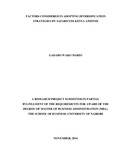| dc.description.abstract | The objective of this study was to establish the factors considered by Safaricom Kenya
Limited in adopting diversification strategies. This study was a case study since the unit
of analysis was one organization. The researcher collected both primary and secondary
data for this study. Primary data was collected using an interview guide. The data
collected from the interviewees was edited for completeness and consistency. Both the
primary and secondary data was qualitative in nature. Given this fact, content analysis
was used to analyze the data. Factors considered by Safaricom Limited in adopting
diversification strategies can be broadly categorized into: availability of workforce,
government regulations, financial capability, attractiveness of the market and availability
of resources and institutions. In developing a product that focuses on a particular
segment, Safaricom limited looks at the functional, social, budget, age and social
characteristics of the respondents to developing products that meet the needs of the
targeted market. The strategy is mostly done on the basis of product bundling and
marketing campaign like enrollment drives. The respondents also noted that version are
informed by value preposition targeted at specific market segments where there's need to
maximize on the opportunity. Safaricom Limited has mainly adopted related
diversification strategy and as mentioned early, Safaricom’s core business is mobile voice
service; however over the years it has diversified to mobile data service; fixed data
services, video conferencing and recently and most success the mobile money transfer
under the brand name M-Pesa. It was also established that Safaricom Business has
evolved into an integrated service provider through delivery of a host of advanced IP,
data, voice, video collaboration tools, and security solutions to meet the needs of business
and government customers. This has been driven by Safaricom’s desire to become the
most admired business partner by developing cost effective solutions that will enable
business succeed. Safaricom Kenya Limited has given the SME Segment, which is
estimated at 120,000 formal businesses, special focus in the course of the year as part of
diversification. From the findings, the following recommendations are made; Safaricom
Limited which is a major player in the telecommunication industry in Kenya needs to
consider other factors in adopting diversification strategies such as the cost of entry into
the new business, the future technological changes and changes in consumer preferences.
These factors would have impact in the dynamic telecommunication industry. To ensure
survival, Safaricom Limited needs to respond effectively to the changes in policies and
regulations which will have impact in telecommunication industry; Safaricom Limited
needs to diversify products that fit its purpose and are economical. | en_US |

